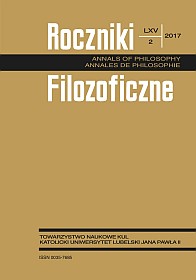Leibniz: Personal Identity and Sameness of Substance
Abstrakt
Leibniz — osobowa identyczność i tożsamość substancji
Teoria Leibniza na temat osobowej identyczności jest od dawna przedmiotem licznych sporów i rozbieżności interpretacyjnych. W niniejszym artykule zestawiam mój pogląd na temat tego, co faktycznie uważał Leibniz za podstawę bycia tą samą osobą z poglądem, który został sformułowany przez Margaret Wilson i Samuela Schefflera. Ich zdaniem Leibniz nie przedstawiał spójnej, jednolitej i przekonującej teorii osobowej identyczności. Jego stanowisko — jak utrzymują ci autorzy — zawiera w sobie zbyt wiele niekonsekwencji, aby można je było uznać za satysfakcjonujące rozwiązanie tego zagadnienia. Nie zgadzam się z tą opinią. W moim przekonaniu bardziej wnikliwy ogląd tekstów Leibniza pozwala stwierdzić, że nie ma podstaw do tak krytycznej oceny wyników Leibniza w kwestii osobowej identyczności. Artykuł składa się z dwóch części. W części pierwszej — korzystając z sugestii podanych przez Vailatigo, Thiela, Noonana i Bobro — staram się przedstawić główne argumenty przeciwko interpretacji Wilson i Schefflera. W części drugiej poruszam dwie kwestie. Najpierw omawiam powody, które Leibniz wymieniał celem uzasadnienia tezy, że osobowa identyczność wymaga zarówno ciągłości substancji, jak i ciągłości pewnych fenomenów psychologicznych. Następnie przedstawiam argumenty Leibniza na rzecz tezy, że tym, co ostatecznie nadaje identyczność osobie, jest jej substancjalna zasada, czyli dusza lub „ja”.
Bibliografia
Die philosophischen Schriften von G.W. Leibniz. Bd. I-VII, edited by Carl Immanuel Gerhardt. Berlin: Weidmann, 1875–1890 (abbr. GP).
G.W. Leibniz Philosophical Essays. Translated and edited by Roger Ariew and Daniel Garber. Indianapolis and Cambridge: Hackett Publishing Co., 1989 (abbr. AG).
Leibniz, Gottfried Wilhelm. New Essays Concerning Human Understanding. Translated and edited by Peter Remnant and Jonathan Bennett. 2nd ed. Cambridge: Cambridge University Press, 1996 (abbr. NE).
Leibniz, Gottfried Wilhelm. Opera philosophica omnia, edited by Johann Eduard Erdmann. Berlin: Scientia Verlag Aalen, 1840 (abbr. Erdmann).
Leibniz, Gottfried Wilhelm. Philosophical Papers and Letters. Translated and edited by Leroy E. Loemker. Dordrecht: D. Reidel, 1969 (abbr. L).
Leibniz, Gottfried Wilhelm. Theodicy: Essays on the Goodness of God, the Freedom of Man and the Origin of Evil. Translated by Eveleen M. Huggard, edited by Austin Farrer. Oxford: Biblio Bazaar, 2007 (abbr. Theodicy).
Bobro, Marc Elliott. Self and Substance in Leibniz. New York: Springer-Verlag, 2004.
Curley, Edwin M. “Leibniz on Locke on Personal Identity.” In Leibniz: Critical and Interpretative Essays, edited by Michael Hooker, 302–26. Minneapolis, Minn.: University of Minnesota Press, 1982.
Graganiec, Mariusz. “O tożsamości osobowej. Leibnizjańskie wątki koncepcji Rodericka M. Chisholma.” Przegląd Filozoficzny – Nowa Seria 100 (2016). 4: 405–19.
Jolley, Nicholas. Leibniz and Locke: A Study of New Essays Concerning Human Understanding. Oxford: Clarendon Press, 1986.
Mates, Benson. The Philosophy of Leibniz: Metaphysics and Language. New York, Oxford: Oxford Oxford University Press, 1986.
Mijuskovic, Ben Lazari. “Locke and Leibniz on Personal Identity.” The Southern Journal of Philosophy 13 (1975), 2: 205–214.
Noonan, Harold W. Personal Identity. London: Routledge, 1989.
Scheffler, Samuel. “Leibniz on Personal Identity and Moral Personality.” Studia Leibnitiana 8 (1976), 2: 219–240,
Thiel, Udo. “Personal Identity,” in The Cambridge History of Seventeenth-century Philosophy, edited by Daniel Garber and Michael Ayers, 868–913. Cambridge: Cambridge University Press, 1998.
Vailati, Ezio. “Leibniz’s Theory of Personal Identity in the New Essays.” Studia Leibnitiana 17 (1985), 1: 36–43.
Wilson, Margaret. “Leibniz: Self-Consciousness and Immortality in the Paris Notes and After.” in Margaret Wilson, Ideas and Mechanism, 373–387. Princeton: Princeton University Press, 1999.
Copyright (c) 2017 Roczniki Filozoficzne

Utwór dostępny jest na licencji Creative Commons Uznanie autorstwa – Użycie niekomercyjne – Bez utworów zależnych 4.0 Międzynarodowe.





